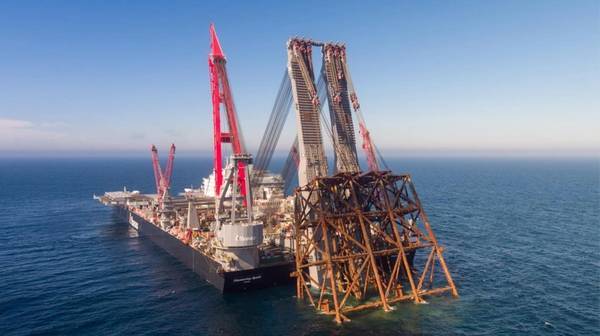
The UK's North Sea Transition Authority (NSTA, formerly Oil & Gas Authority) says an estimate of the total cost of decommissioning UK Continental Shelf (UKCS) oil and gas infrastructure fell just 2% last year. The drop, following a 4% reduction the year before, sets the industry on course to miss a 35% cost reduction target set in 2017.
In the UK North Sea, operators receive tax breaks on their decommissioning spending, which means this cost partly falls on tax payers. This has meant it's become a focus area for the NSTA. In 2017, it set a target to cut the total estimated decommissioning cost of the UKCS by 35%, from a £59.7 billion baseline. Despite having made swift progress in the first two years of the target, cutting the estimate by 17%, progress has slowed.
In 2021, the total fell by £1.5 billion (2%) to £44.5 billion, putting the overall reduction since 2017 at £15 billion (25%). NSTA says the slow down is "partly due to the logistical and economic pressures of the Covid-19 pandemic", but that "progress has continued. Importantly, the scale of reductions to the estimate is reflected in the final costs of completed projects, which are on average 20-25% lower than initially predicted for the period 2017-21."
"This was a sizeable investment in the face of unprecedented logistical and economic pressures, and points to industry’s determination to carry out planned work and meet its decommissioning obligations," NSTA said. "The highly ambitious 35% target was always intended to be challenging and the significant savings already delivered greatly benefit companies, which can invest more in production and emissions reduction projects, and taxpayers by reducing the cost of decommissioning tax reliefs to the Exchequer.
"Improving performance on costs is likely to be challenging in the short term due to market inflation and competition for resources from other energy sectors. Therefore, the report calls on industry to redouble its efforts, ensuring that it plans effectively, collaborates on innovative commercial models, deploys new technologies and, where possible, reuses and repurposes infrastructure – all of which are priority areas in the NSTA Decommissioning Strategy. Repurposing infrastructure for energy transition projects, including carbon storage, can also make a significant contribution to the UK’s drive to net zero."
The NSTA is now engaging with the sector to launch a new baseline estimate and cost efficiency target, effective from the start of 2023.
Spending on decommissioning has also slowed. NSTA said that, in 2021, decommissioning expenditure totalled £1.2 billion, lower than the forecast £1.4 billion. It said this was due to improved project execution and Covid-related deferrals of activity.
"This was a sizeable investment in the face of unprecedented logistical and economic pressures, and points to industry’s determination to carry out planned work and meet its decommissioning obligations," it said.
NSTA says decommissioning spend is expected to ramp up to a peak of more than £2.5 billion per year over the next two decades, offering a long-term opportunity for the supply chain to develop cost-efficient services and win more work overseas.
Pauline Innes, NSTA Head of Decommissioning, said: “Delivering potential savings of £15bn during a short period marked by extremely turbulent economic conditions should give the sector confidence as it looks to the future. The decommissioning market is worth tens of billions of pounds in the UK alone. Our industry is demonstrating that it can complete projects safely, efficiently and economically in the North Sea, and that places it in a strong position to compete for what is a big international prize. The sector must not lose focus and allow inflation to drive up prices. Now is the time to build on the progress already made. The NSTA is determined to help the sector pick up momentum, including through the introduction of new estimates and targets.”
Read the full report here.